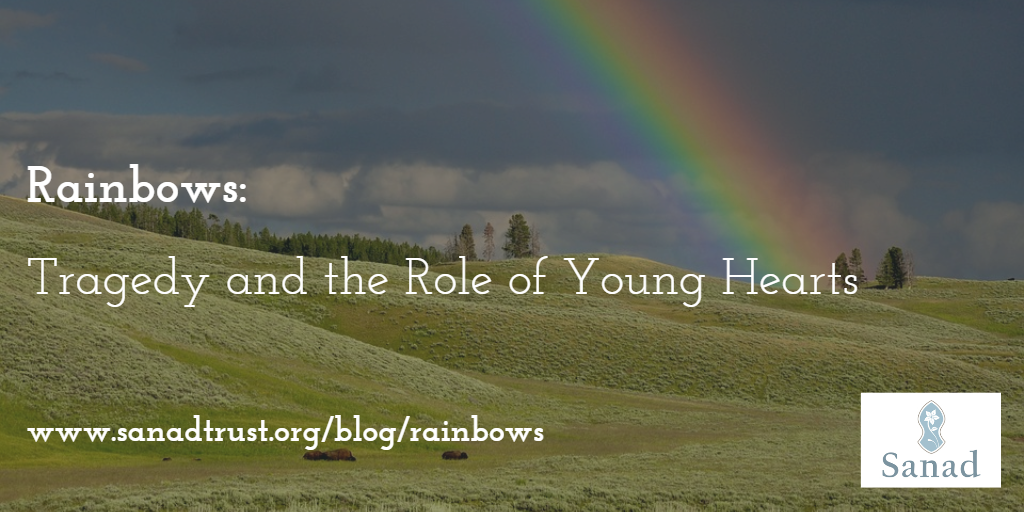Rainbows: Tragedy and the Role of Young Hearts
By Rehan Mirza

A rainbow is a meteorological phenomenon that is caused by reflection, refraction and dispersion of light in water droplets resulting in a spectrum of light appearing in the sky. It takes the form of a multicoloured circular arc. Rainbows caused by sunlight always appear in the section of sky directly opposite the sun.
This post is a small effort to empower parents, teachers, and youth to help each other cope well when pained by tragedy.
We can only know the limits of the universe (maybe)
I often find myself in the lives of young people at critically emotional points in their lives. The moments are all formative, and often transformative. The direction children and young adults move however is often determined by the love and wisdom — in the form of action and words — that has been invested into them before and immediately after these moments.
I have been with them as they face death, despair, depression. Their glossy eyes and innocent hearts are a testimony to Allah’s detailed and delicate touch on His creation.
Within those eyes though is a limitation. They (and I) can only see so far and only so clear. This in terms of both the physical reality of what we observe, but also the metaphysical reality of what we experience.
We can only know the limits of the universe (maybe). God unveils what He wants from the outer and inner (the seen and unseen) matter of things. So although we may see to edge of universe, we still only see the outline of what He permits. It is only with the application of light filters on the hubble telescope that we discovered countless unseen galaxies, nebulae, and stars. Even then, one wonders what we still cannot see.
Events in the world and in life are like the seen and unseen celestial bodies of space. It is the responsibility for parents and teachers to help our youth understand the majesty and grandeur of God from an early age. This is facilitated in part by us sharing the limitations of our ability as a creation of the Creator. The former cannot contain the latter, and that is frustrating sometimes, it is painful sometimes, and it is humbling every time.
The spiritual rainbow
So what can our youth do when a tragic external event impacts the spirit and psyche? They should be reminded that God is aware. It is not a requirement upon God to make all events rational to all or even one of His creation. The degree to which they understand these events and cope is correlated, in part, with the degree to which we have invested in the tools of spiritual and emotional cognition in them. Even then, the truth is the question of ‘why?’ may never be entirely answered in their or our lifetime. This questions is what I call the Great Humbler (and God is even Greater), because that question too is a creation of God. Thus, this perspective is an integral component to our response. It can help guide and equalize emotion during turbulent times.
One of the greatest counsel we can give young people is making them aware of the impact their souls can have on the world around them. That not only do their emotions matter in these tragic moments, but so does their soul. A visceral response cannot be offered without a spiritual response. Many of them will feel, some of them may be able to advocate, but few are equipped to respond spiritually.
This inward response includes be grateful for the multitude of blessings that become magnified and more apparent when darkness is cast in a distance. When we see storm clouds forming and rain falling far away, we should appreciate our weather and sunshine a little more. Supplications and testifications of gratitude should be formed in their heart and on their tongue (even if silent).
It should also entail heartfelt dua outside of themselves for those in need. Our communities and families, including our children and youth, should be an expansive spiritual rainbow in these times. Our spiritual light in all its splendor, from all corners of the world and different origins, all reaching the point of need simultaneously.
Young people should be taught how to pray for others. There are so many layers of cognitive, emotional, and spiritual growth it fosters. It is among the most real and special things they can learn. It will occupy them in khayr (goodness) and khidma (service), and most importantly keep them close to God.
Where it will rain, only Allah knows.
When we reflect on the development of a child we are talking about one of the most enigmatic, complex, and sacred designs of Allah’s creation. When we discuss this within the framework of tragedy we are trying to read light in broken glass.
Parenting and teaching is a sacred trust. So much building should take place within us before and as we raise our children, so that we can help them carry the weight of life’s varied lesson and assist them in navigating its capricious meandering way. These lessons and rivers begin and end with Allah.
The sun is still in the sky even in the rain. And where it will rain, only Allah knows.
And Allah always knows best.
Rehan Mirza earned his M.A. in Social-Organizational Psychology from the Teachers College at Columbia University in New York City. Currently he is Founding Executive Director of Sanad Trust Foundation a non-profit built on the framework of a social-business startup. Sanad Trust looks at education, community service, and institution-building from the inside out with a soul-centered perspective.
This is a test bio for the widget style
